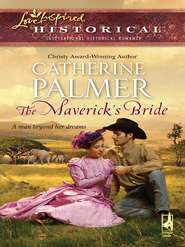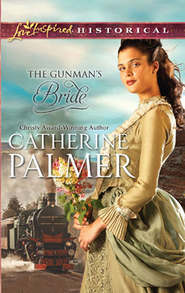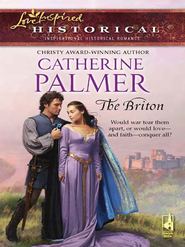По всем вопросам обращайтесь на: info@litportal.ru
(©) 2003-2024.
✖
The Outlaw's Bride
Настройки чтения
Размер шрифта
Высота строк
Поля
Sighing, she pulled her lace mantilla closer around her face, lifted her chin and walked on through the scrubby, wind-whipped trees. Her emerald hem swept across fallen, brown pine needles, the ruffle on her skirt rippling along behind.
It had happened here, she thought, near this very place. A shiver of apprehension coursed through her as she looked in the twilight at the secluded forest. Five years earlier, her father—the powerful Don Alberto Matas—had been jerked from his buckboard wagon and shot.
Isobel tightened her knotted fingers inside her muff and squeezed her eyes shut against the sting of tears. As a child, she had believed her father invincible.
Forcing away the fear that haunted her—transforming it to the more comfortable heat of anger—she gritted her teeth. Why had the lawless Americans done nothing to find her father’s murderer? Not only a murderer but a thief. The killer had stolen the packet of land-grant titles and jewels that had been her inheritance—the dowry to secure her marriage to Don Guillermo Pascal of Santa Fe.
She inhaled a deep breath of crisp, pine-scented air. Five years had passed, yet the anger and betrayal still burned brightly in her heart. Despite the pain, the five years spent managing her father’s vast estates in Spain had been good ones. She had overseen lands, governed workers and carved a faith that could not be shaken. And then she had traveled to America.
Though at twenty-three she knew her hopes of marriage might appear dim, she still was betrothed to Don Guillermo. She would see to it that he married her. She would recover her stolen inheritance as well. Isobel Matas was not one to cower when faced with a challenge. Glancing behind, she scanned the scrub oak and twisted-pine woods. The small party of travelers who had accompanied her from Texas to New Mexico—an itinerant preacher, a missionary doctor and his family, a schoolteacher—rested from the journey. Their horses grazed, tethered a safe distance from the trail.
The delay would put them in Lincoln Town after dark, too late for her to speak to the sheriff. She chose not to tarry and drink coffee. Instead she walked alone through the forest and thought about her father. If he hadn’t come to the New Mexico Territory, he would still be alive, his golden hair shining in the sunlight, his deep laughter echoing over the rolling hills of Catalonia.
Hoofbeats thudded across the damp snow. Her eyes darted toward the trail. Highwaymen? Banditos, like the men who had murdered her father?
Alarm froze her breath. Her traveling companions were too far away to be of help, and she had left her pistol in her saddlebag. Clutching her mantilla at her throat, she melted into the shadows of a large juniper. Leaning against the rough trunk, she peered through the lace in the direction of the sound.
“Things are unhappy indeed in Lincoln Town, Noah.” A young voice. English—not American.
“We’re glad you’re back from the trail. Mr. Chisum is wise to let you run his cattle. South Spring River Ranch profits under your management.”
Isobel counted three riders, one dapper in a brown tweed coat, the others roughly dressed, their faces obscured by hats and heavy beards. Livestock behind. More men at the rear.
The man called Noah rode tall on his black horse. He wore a long coat of black leather and was massively built, with broad shoulders and lean, hardened legs. With skin the color of sunbaked adobe, his face was grim beneath the wide brim of his black felt hat. His blue eyes flashed back and forth…alert, missing nothing. This man—and not the dandy—knew a dangerous life.
“Do you suppose Mr. Chisum would take my side against Dolan?” The young Englishman’s voice held a note of hope. He could not be more than thirty years old.
Noah shrugged. “Chisum stays out of a fight until it reaches his own back door.”
“Don’t worry, Mr. Tunstall,” the third rider put in. “He’ll come out of that jail fightin’ mad against Dolan.”
“I expect so—” the Englishman began. A raucous squawk shattered the stillness in the canyon. Isobel stiffened.
“Turkeys.” Noah Buchanan rose in his stirrups and searched the gathering dusk. “How about it, boys? Let’s bag one.”
“Sure!” The slender man slid his rifle from his saddle scabbard. “Coming, Mr. Tunstall?”
“No, thank you.” The Englishman beckoned the three riders behind the packhorses. “But go on—all of you. Perhaps Mrs. McSween will cook it for us when we get to Lincoln.”
The men set off toward the nearby ridge. Noah glanced to one side, and his eyes fell on Isobel. He frowned. Reining his horse, he let his companions ride on.
“What have you there, Buchanan?” the Englishman cried out.
The American looked at Isobel an instant longer, as if to confirm the strange apparition in the woods. “Some kind of bird,” he called back.
She squared her shoulders and lifted her chin. Bird? She knew the man might do anything. Yet there was something gentle in his manner. Perhaps it was the way he held the reins…as if he were an artista. She had seen the hands of a poet and she felt sure this man’s hands, though large and strong, held no malice.
Glancing at her one more time, his eyes flashed with—what was it—warning? Then he flicked the reins and his horse vanished into the woods.
Isobel licked her wind-parched lips. Looking up, she saw suddenly what the others had not. Forty or fifty armed horsemen guided their mounts down onto the trail from the ridge.
“Tunstall!” A shout rang out from halfway up the slope. “That you, Tunstall?”
The Englishman reined his horse. “Who’s there?”
“Jesse Evans. I’m with Rattlesnake Jim Jackson and a posse Jimmie Dolan sent to round you up. He made us deputies.” The riders advanced to within twenty yards of Tunstall, and Isobel calculated they would meet directly in front of the juniper tree.
“Come ahead, Tunstall,” a second man commanded. The blue light of the setting sun coated his heavy jaw and wide nose. “We ain’t gonna hurt you.”
“What is it you want, Jackson?” Tunstall kept riding as the men facing him lifted their rifles so the stocks rested on their knees. Isobel tensed, willing the Englishman to draw his own weapon. Could he not see these men meant to harm him?
Jackson urged his horse forward.
“Not yet,” he muttered to Evans. “Wait till he gets nearer.”
Isobel’s mantilla buffeted her face, and she struggled to push it aside. She must warn the Englishman. But at that moment, his companions burst through the trees onto the trail.
“Take cover, Tunstall!” Buchanan shouted. “Head for the woods!” “Now!” Jackson raised his rifle and fired. Tunstall jerked backward and dropped from his horse to the frozen ground.
Evans dismounted and ran to where Tunstall lay face down. He pulled Tunstall’s revolver from its holster and shot the fallen man in the back of the head. Then he turned the gun on the horse and pulled the trigger.
Isobel swallowed in revulsion. She realized that Tunstall’s friends had been too late to help him. They dispersed into the woods as the posse crowded forward, a mixture of triumph and horror written on their faces.
“With two empty chambers in Tunstall’s gun,” Evans crowed, “the judge’ll think he fired first. Let’s round up the rest of his men and give ’em the same medicine!”
Trembling, Isobel watched Evans remount and ride away. Jackson and three others remained. They stretched out the Englishman’s body and wrapped it in blankets. Chuckling, Jackson pillowed Tunstall’s head on a folded overcoat. Then he laid the horse’s head on the Englishman’s hat.
“This is abominable,” Isobel muttered, icy fear melting before crackling rage. And suddenly she saw her father—lying just as Tunstall now lay—murdered, with no one to defend him.
As she stepped from behind the juniper, the wind caught her lace mantilla, tugged it from its comb and whipped it across the trail like a dancing butterfly. She caught her breath. Jackson glanced up and snatched it midair. Frowning, he spat, and stepped over Tunstall’s body. “Don’t move, se?orita.” His voice dripped with contempt. “Hey, fellers. Looks like we got us a Mexican.”
Isobel swallowed the last of her fear and remembered the raw wound of her father’s death. A familiar anger flowed. If she must die, she would die bravely. Lifting her chin, she stepped onto the trail.
“You…” She stopped before the men. Forcing herself to think in English, she spoke. “I have seen your murder. I curse you—asesinos—assassins!”
“You ain’t seen nothing yet, honey.” Jackson whisked his rifle to his shoulder. But before he could fire, a horse thundered across the trail. Its rider leaned down and swept Isobel from the path of a bullet.
“You’re dead, you little Mexican!” Jackson’s voice rang out behind her. “I swear I’ll kill you!”
“Keep your head down, lady.” Noah rode through the trees, one arm around the woman’s waist, the other controlling his horse. “They got Tunstall, didn’t they?”
“The man called Rattlesnake killed him,” she cried. “Give me your rifle and horse. I shall make them pay.”
“Whoa, now.” Noah reined his horse to a halt beneath an overhanging sandstone ledge. As he lowered his bandanna, he looked the woman up and down. Emerald gown, red ruffles, crimson boots. “Give you what?” he asked.
“Your horse. Your rifle. For revenge.”
Around them, all had calmed—the wind, the horse, the trees, Noah’s pounding heart. He studied her eyes, her nose, the high curve of her Spanish cheekbones and her lips.










